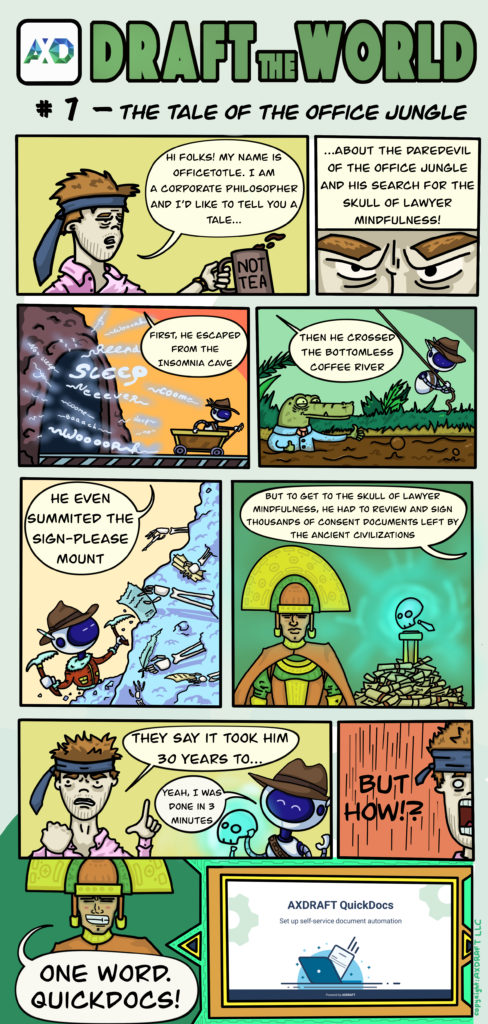When you were going to law school and dreamt of becoming a lawyer, no one probably told you that sometimes you’ll be drowning in a mix of coffee, paperwork, and screams of urgency from your clients and colleagues.
Alas, the day has come. You’re fighting your way through the corporate jungle, trying to get a Master Service Agreement approved by your boss before they leave for vacation. En route to their office, you get a batch of ‘?urgent’ NDAs to review stacked on top of you, and have to explain the dispute resolution clause to the sales team.
What a lovely, beautiful Tuesday morning!

Meet the kings of the jungle
If there was a door to the client’s office, there would be a sign with two rules nailed to it:
- Rule #1: The client is king
- Rule #2: If the client’s wrong, see rule #1
For a corporate lawyer, the company is their client. Board of directors, sales & marketing teams, HR, even the company’s actual clients’?everyone wants to receive a piece of legal advice, check ‘?just one little thing’, or approve a new contract for office coffee supply. Of course, every task is of utmost urgency, and should have been done yesterday.
You don’t have a time machine? Well, you’ll have to work faster then.
Our 7th episode of the ‘?Draft the World’ series takes Drafty on an adventure into the depths of the corporate jungle so that he can see all the excitements and attractions for himself. While Drafty is having fun, we’re going to talk about two main problems that lawyers have when dealing with clients: Communication and task prioritization.
Problem #1: Knights of stalling vs. urgency warriors
Just imagine: you’re deep into work, because you have to report to the company board on the merger they’re planning to undergo. In the middle of your research and studies, a sales rep rushes in and drops a stack of papers on your desk.
Completely befuddled, you receive a stream of words racing into your ears saying that youhavetoveryurgentlyplease review the sales agreement they’ve drafted, and approve the signed NDAs right now, because their client wants to see the SOC 2 report.
Noticing that some contracts are filled in with errors and miss important client data, you find the salesperson and ask them to provide you with the right info. But now they’re not that urgent, and the salesperson is busy with other sales tasks. So much for storming in earlier that day!
Now you’re left with an unfinished task, and have lost valuable time away from the matter that’s actually important’?the merger question and reporting to the board. It’ll still take you some time to recall where you left off, and focus back on the issue.
Speaking the same language
We all know that corporate Babylon speaks different languages. Legal, however, is the most complex of them. Well, maybe the IT department could compete with you, but that’s not for sure. You didn’t go to law school for nothing.
There’s a task that can pop up out of nowhere and land directly on your schedule: explaining contract clauses. Contracts give headaches to people without legal background. They don’t like not understanding, but they simply can’t grasp the idea behind some of the abstracts that lawyers put into legal contracts.
After drafting a document, a lawyer may have to walk around each person included in the approval process, and explain each point of the contract and its overall idea. The company values your input and puts you as an exemplary employee that regularly works on nurturing internal communications. It’s nice of you to take part in daily conversations with colleagues.
Self-service contracts: heroes of the jungle
It’s not always that you can find a true corporate hero, but technology is selflessly trying to come to rescue. Self-service contracts, such as AXDRAFT QuickDocs act as gatekeepers of lawyer’s mindfulness and absolute focus, helping legal practitioners avoid unnecessary communications and focus on legal work that does not involve talking to people.
The beauty of self-service document automation software is that it can engage the client all by itself, and address all their needs without distracting a lawyer. Here are some examples:
- Urgent requests are taken care of by the clients. All they need is to fill in the questionnaire with their info and click a couple buttons. The NDA is sent to their email the moment they click ‘?Magic’.
- No more stalling. You can set up self-service contracts to automatically send the necessary information right after the contract is signed. The client has full control over receiving the information they need.
- Using GPT-3 technology, the language of every contract is changed from legal to common. You can choose from up to 150+ languages and if your client is at least a 9-grader, they’ll know what the contract is about.
- Engaging experience with conditional clauses. By choosing certain options in a questionnaire, your clients can use self-service document automation as a Lego and play around with the final look of the document.
Having taught computers to do routine legal work, we taught them to appreciate lawyers and understand legal pain. That’s why you can rest assured that self-service document automation software will make sure that your day has less distractions, and your clients are happy and have a beautiful tool they can play with and get their legal questions resolved.
Now that you’re free from the office jungle hustle and bustle, sit back and relax. Check out Drafty’s other adventures while having a mindful moment of bliss: Legal Mortal Kombat, Legal Operations Ghosts, The Big Draft Theory, Contract Management Abra-Draft-Cadabra, or The Ultimate Contract Bender